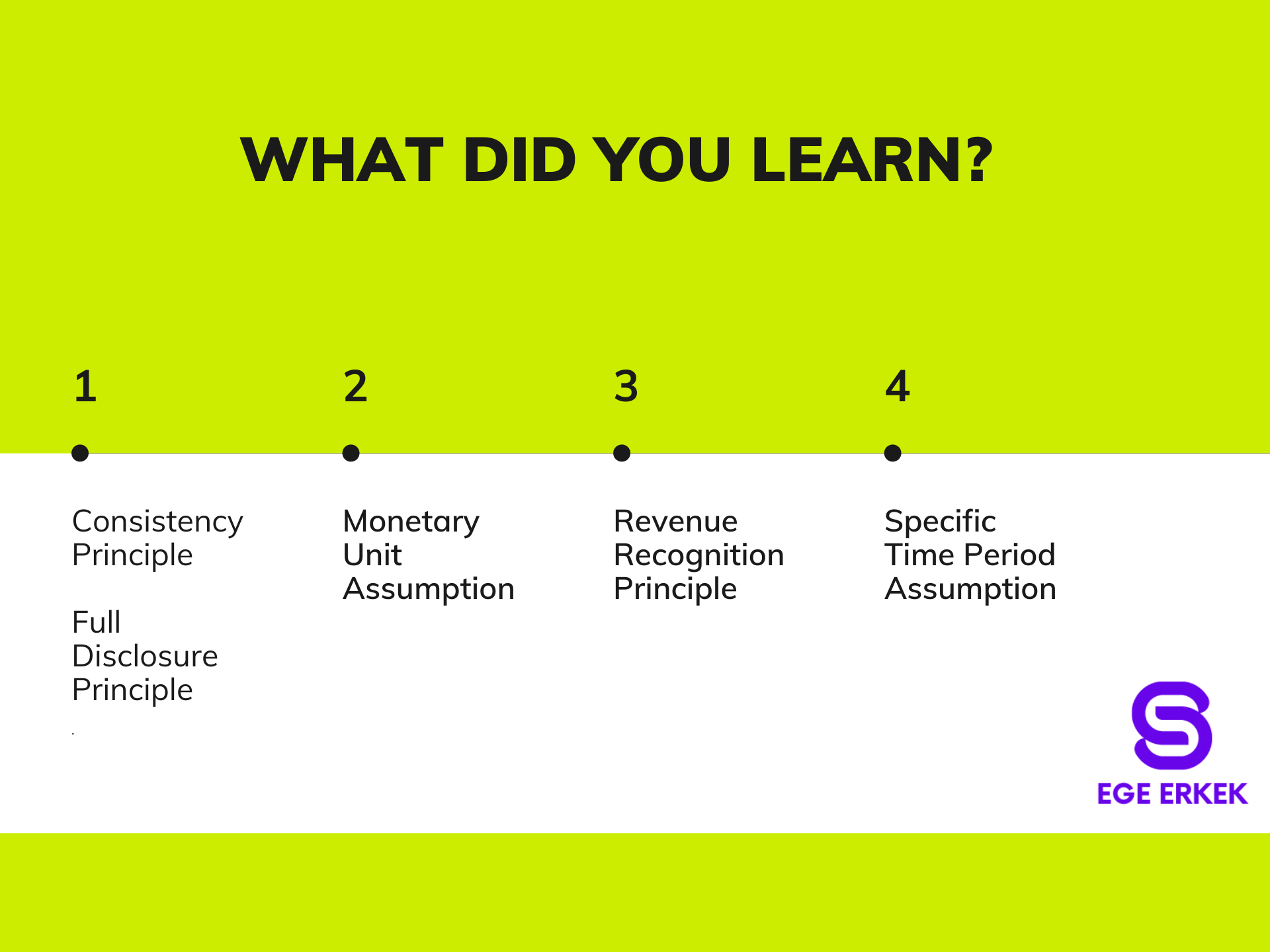➤ Generally accepted accounting principles directly affect your entrepreneurial image and project. If you are the accountant or have your accountant to do the money matters, it is in your best interest to know these principles in advance because some practices in this area may not seem logical at first glance.
➤ There is technical reasoning behind these teachings, abbreviated as GAAP. I have reviewed these guidelines, which are divided into assumptions, principles and constraints.
➤ If you crave to protect your investors and yourself from fraud or horrifying legal troubles, strictly follow these guidelines (especially if you have a public company), which guarantee a measure of consistency.
➤ These principles are not included in this article: Conservatism, Cost Constraint, Historical Cost, Materiality, Objectivity.
➤ Should you want to reach me from my social media accounts or send your article, please access the Contact or About pages. Also, you can join our community NOW! Please make a comment and share this article on your social media profiles.
➤ Before you read this article, would you like to learn Secrets of bookkeepers?
What are generally accepted accounting principles?
Why generally accepted accounting principles are important?
Table of Content
“Accounting is the language of business.”
5 Generally Accepted Accounting Principles
➤ If you need more information, the course contents prepared for the CPA or your accountant will help you in detail. Let’s start with assumptions.
✅ Monetary Unit Assumption
➤ A commercial bank account should not be merged with your personal bank account. This principle, which is directly related to the business entity assumption (separate entity assumption), sees a business as a living entity on its own.
➤ This includes sole proprietorship because your business stays in place independently of you (even if you sleep at home). Monetary Unit Assumption argues that all your financial activities should be linked in the same currency.
➤ You must convert the payments you receive from abroad into a currency that your company recognizes and save this transaction with your country’s currency records.
➤ Inflation is not effective in a business’s financial reports because, according to the accounting industry, the purchasing power of currencies is nearly always constant over time.

✅ Specific Time Period Assumption
➤ The balance sheet always covers a period or a date. In order for your financial reports containing your profit and loss statements to make sense, it is essential to refer to a specific period.
➤ If you say you will serve for decades (like Ford, Mercedes or Samsung), it is a must to have your income and expenses under control.
➤ Do not expect uncertain financial reports to show when you made a profit and when you struggled with expenses. Businesses maintain continuity with the Going Concern assumption, also called the Non-Death Principle.
✅ Revenue Recognition Principle
➤ Most small businesses (like a barbershop or a bakery) systematize their income and expenses with a cash background. In short, it bases its reports on a cash basis. In such places, taxes are also based on this principle. The matching policy recommends reporting on an accrual basis.
➤ In this context, the money spent on production is reported in the same accounting period: wages, sales commissions, general expenses and the like.
➤ When it comes to the Revenue Recognition Principle (RRP), the accrual basis accounting principle comes into play again. According to the RRP, it does not matter when you get paid for a product or a service. You need to report that payment instantly. Once you invoice your customer, you are now responsible for reporting.

✅ Full Disclosure Principle
➤ All information regarding the functions of the financial information contained in the financial statements of your business must be 100 percent clearly explained with notes.
➤ Thanks to this principle, investors and shareholders are prevented from being deceived.
✅ Consistency Principle (Constraint)
➤ According to this principle, your accountant has to use the same accounting techniques for each accounting period and stick to the same accounting principles.
➤ Thus, how the data in your financial statements are obtained and their evaluation will be carried out consistently. Comparisons between tables will also host a more efficient and uncomplicated structure.
➤ What do you think about Generally Accepted Accounting Principles?


